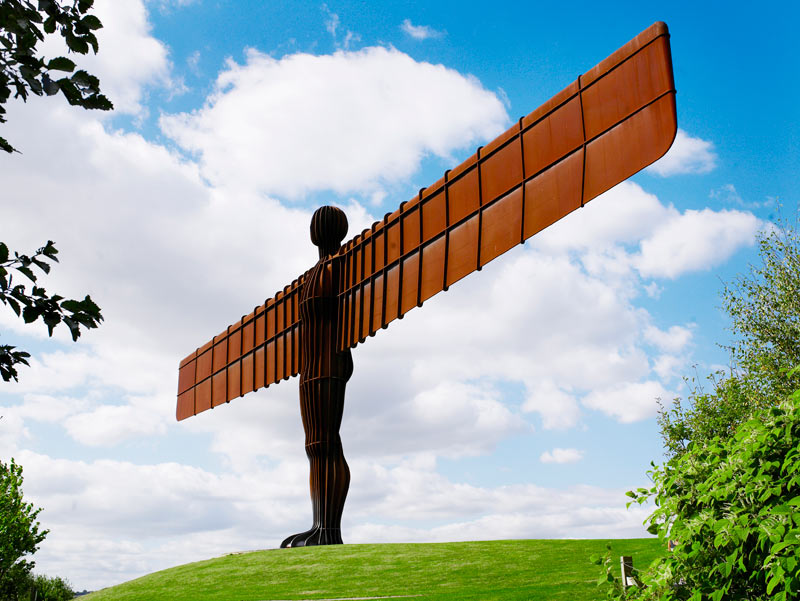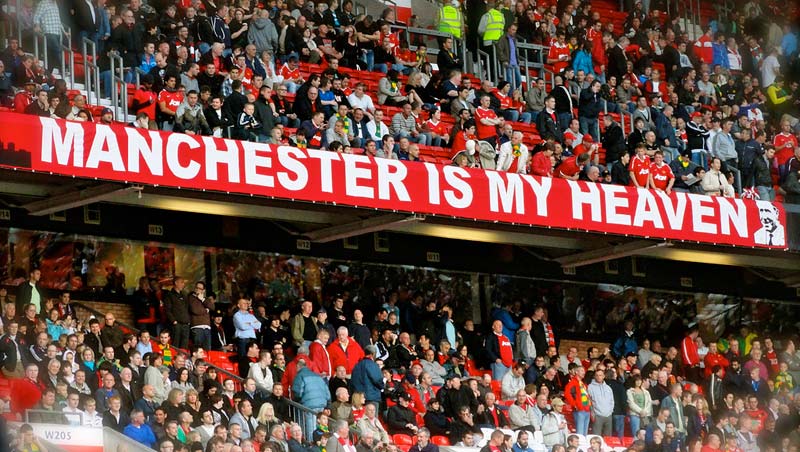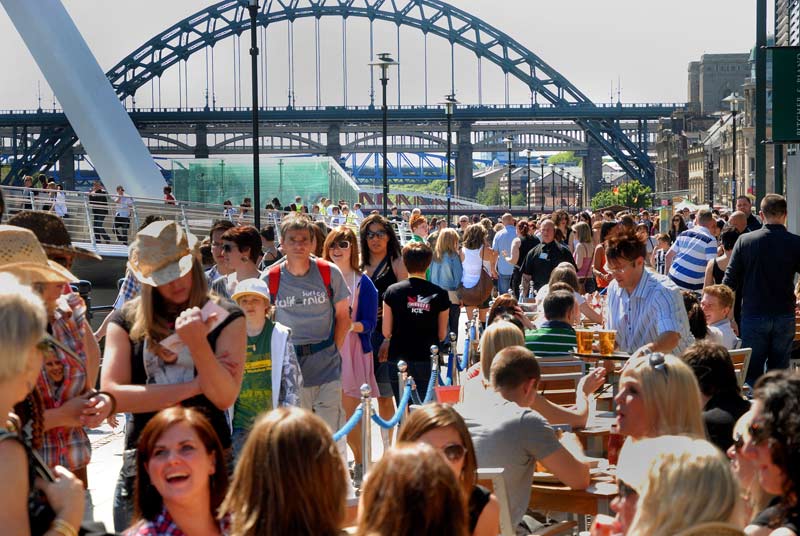In 1900, the north of England was one of the most productive and successful regions anywhere in the world. 40% of the world’s trade passed through the docks at Liverpool, while the factories of Newcastle and Manchester produced goods that were shipped to all corners of the globe. This was the cradle of the industrial revolution at its most powerful.
And then came the hard times.
The next hundred years saw the end of the British Empire, declining competitiveness and heavy wartime bombing by the Luftwaffe. Populations shrunk in all of the major northern cities as their traditional industries suffered.
But everything is cyclical and big things are happening again, as the cities of Northern England and Scotland have reassessed their strengths and a renaissance is in full bloom!

Angel of the North, Image: Newcastle Gateshead Initiative
If you are thinking about an English course in the UK, by all means consider the classic destinations like Brighton and London, but don’t discount the idea of something different.
Sarah Byrne from the Liverpool School of English says that “The north is unique because the sense of identity here is strong, northerners are very proud of where they’re from and take pride in making visitors feel very welcome.” This is a sentiment that is echoed by many of our partner schools, for example Patricia Mullen from IH Newcastle describes the north as “culturally more ‘British’ than other parts of the UK”, while Nicola Wyley from Manchester Academy highlights a “great sense regional identity and pride… people take ownership of the music, arts, food, fashion that comes out of the cities in the north and celebrate them.” All three mention how friendly people are, which is something you will recognise the moment you arrive.
The excellent value on offer “north of Watford” (as English people informally describe the Midlands and north of England) is another important factor; the cost of living and studying is significantly lower than in London and the South. So it’s welcoming, affordable and thriving – have you considered the Northern cities for your English course?
Liverpool
Sarah from LSE says that “since the 2008 capital of culture we are genuinely experiencing a renaissance in art and culture…. every month new events, projects, attractions and entertainment venues are launched.”
Liverpool will always be associated with the Beatles and there is plenty of fab-four nostalgia to enjoy, but the local music scene has never stopped innovating and is one of the city’s enduring attractions. There is something new to enjoy every night of the week and the local student population ensures a young and enthusiastic crowd. Mathew Street, home of the Cavern Club, is a popular destination for students on a night out.

Dreamspace Liverpool, Image: Andy Miah
During the summer, festivals like Africa Oyé in Sefton Park and the Liverpool International Music Festival keep the city swinging, while there is probably the best selection of museums outside of London to enjoy year round, and most of them are free to enter.
Sarah suggests Liverpool is becoming a top study-abroad destination in the UK as students have a “more authentically British experience than in very touristy destinations… students return as well as recommending the area to friends because they appreciate the open hospitality of the people here, they find it easy to make friends and have a good time.”
Check out 10 things to enjoy in Liverpool for under £20.
Manchester
The rebirth of urban Manchester started under inauspicious circumstances after an IRA bomb in 1996 destroyed much of the city centre (fortunately nobody was killed). Locals saw an opportunity to replace the unloved 1960s architecture with something more appealing and the city centre is now thriving again, and much more attractive.
Nicola from our partner school in Manchester says “it’s vibrant, young, dynamic and exciting…. and a hub for the creative and media industries.” The BBC relocated a large amount of its production from London to Manchester in 2011, and the local creative industries have been booming ever since.
There are free festivals, artisanal markets, vintage fairs, impromptu concerts, pop-up bars and restaurants to enjoy throughout the year and students at the respected local universities attract students from Britain and around the world. Their presence boosts a music scene that has produced the Stone Roses, Oasis, Elbow, Mr Scruff and Chemical Brothers among others. Annual events include the Manchester International Festival, Manchester Pride and Parklife.

Old Trafford, Image: Paulo Camera
The two major local football clubs – Manchester United and Manchester City – are a major draw and have ensured the city’s reputation as one of the UK’s great sporting cities, while the British cycling team is also based here and you can watch them practice at the impressive velodrome.
According to Nicola, students “love the fact it is intimate and friendly, as well as the fact that it is a truly international and cosmopolitan place, on par with some of the world’s great cities… where else can you watch the GB cycling team training in the velodrome, sit in Sir Alex Ferguson’s chair at Old Trafford, try your hand at reading the national news at the BBC Television Studios and then go a for a Michelin-starred dinner?”
Newcastle
Another major university city, but this time on the other side of England (in the North-East), Newcastle has “a real student-centred dynamic which gives the city a buzz” according to Patricia from our partner school in the city. “The city has great transport links (we even have an underground!) which makes travel both easy and very economical.” The local arts scene is thriving, particularly since the opening of the BALTIC centre, where you can see various exhibitions and installations from contemporary artists.

Image: Newcastle Gateshead Initiative
Newcastle is known across the UK for its nightlife and has been regularly voted the UK’s party city, where partygoers are famous for dressing for a summer’s evening… whatever the weather. If the late nights leave you with a sore head on Sunday morning, there is plenty to enjoy outside of the city and the Northumberland coast has some of the finest beaches and castles in the UK; they are often used as locations for movies. The Scottish border is just an hour away so students have the opportunity to see both England and Scotland.
York, Glasgow, Aberdeen…
Some of our destinations in the North of England are quieter, but no less enjoyable than the big cities. York, for example, is like something out of a Harry Potter book (the city was often used as a backdrop in the films). Or for a different taste of the United Kingdom, cross the border and experience Scotland.

Image: Cristophe Becker
Edinburgh is Scotland’s major tourist city and is one of the UK’s most popular destinations, but there is much to enjoy in Scotland away from the capital city. Glasgow, for example, is an exciting alternative that is enjoying its own post-industrial renaissance. GoMA is the most visited modern art gallery in Scotland while the “Old Firm” rivalry between the local football clubs Rangers and Celtic is legendary (if temporarily on hold).
Further north, on the coast, Aberdeen is a popular university city that offers an exceptionally friendly welcome for visitors. Because of the distinctive stone used to make the buildings, Aberdeen is sometimes known as Granite City; it is the most northern destination to learn English with ESL from more than 200. It is also the gateway to the very north of the British Isles, the highlands, standing stones, castles and magical Scotland!
Contact us to find out more about any of our exciting destinations in the North of England and Scotland.


